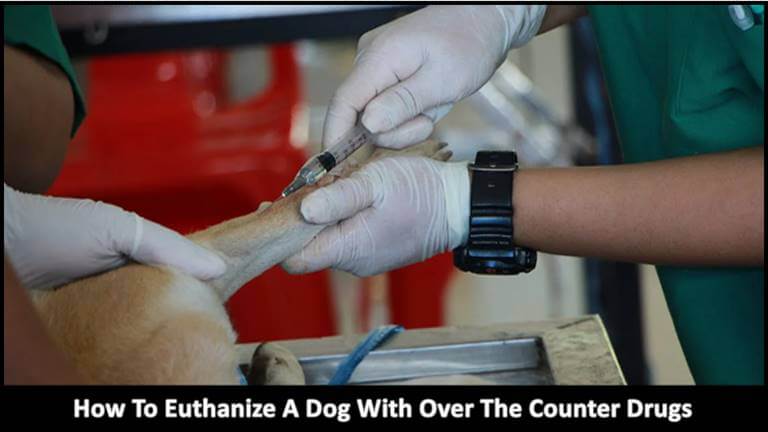Euthanasia is a difficult topic for any dog owner or handler to consider, as it involves making a heart-wrenching decision to end the life of a beloved dog. However, it is also an important consideration when a dog’s quality of life is deteriorating, or when it is facing a painful or terminal illness.
The use of over the counter drugs for euthanasia is an option that some owners may consider due to financial or other reasons, but it’s crucial to approach the process with care and understanding. In many cases, seeking the advice and guidance of a veterinarian is recommended, as they can provide support, counseling, and assistance in ensuring that the euthanasia process is carried out as humanely and safely as possible.
It’s also important to consider the emotional impact of euthanasia on both the dog and its owner, and to take steps to address any grief, guilt, or other feelings that may arise as a result of the decision. While no decision regarding euthanasia is easy, understanding the options available and taking a compassionate and informed approach can help ensure that the process is as peaceful and respectful as possible for all involved.
What Is Dog Euthanasia?
Dog euthanasia is the process of ending a dog’s life in a humane way when they are suffering from a serious illness or injury that cannot be treated or managed. It is a difficult decision that dog owners and handlers may have to make to relieve their pet’s suffering.
Euthanasia is a method used to put an animal down without causing them any pain. This process is carried out by a trained professional, typically a veterinarian or technician. There are several options available, including gassing and lethal injection, but the most common method involves injecting a barbiturate, like sodium pentobarbital, which may be given along with a sedative like butorphanol.
How To Euthanize A Dog With Over The Counter Drugs?
If you are curious about the process of euthanizing a dog using over-the-counter drugs, you have come to the right place. Benadryl, Tylenol PM, and Sleeping Pills are all viable options for humanely euthanizing a dog.
Benadryl
Benadryl is a medicine that helps with allergies. But it can also be used to make someone go to sleep and stop feeling pain before they die. The safety of giving Benadryl to a dog depends on various factors, including the dog’s size and weight, as well as the type of medication. Benadryl is typically safe for dogs as long as the recommended dosage of 1 milligram per pound of body weight is not exceeded.
Giving a dog more than 4 milligrams per pound of body weight per day can be fatal. The dosage may vary depending on the form of the medication and it is best to follow the dosage instructions provided by a veterinarian or the medication label.
Tylenol PM
Tylenol PM is a medicine that can be used to put dogs to sleep forever. However, this does not mean that it is painless. It can cause damage to the dog’s liver and kidneys, which eventually leads to death. It is essential to talk to a veterinarian before giving any medication to your pet.
It takes a while for Tylenol PM to work in dogs because they are big, and it needs time to be digested. It can take anywhere from one to two days for the drug to take effect. The amount of Tylenol PM needed to put your dog to sleep permanently depends on their weight. A general rule is 100mg of Tylenol per kilogram of the dog’s weight. For example, if your dog weighs 15 kilograms, you will need 1500mg of Tylenol PM to euthanize them. It’s essential to be aware of these facts.
Also Read: Is Dog Mounting A Sign Of Dominance?
Sleeping Pills
When it comes to euthanizing a dog, it is a difficult decision for pet owners. While veterinarians commonly use pentobarbital sodium for euthanasia, but in some cases, sleeping medication can be used to make the dog more comfortable before the euthanasia procedure. This may involve administering a sedative to calm the pet and help them relax. This can also help the pet owner by making the process less traumatic and emotional.
It is important to discuss all available options with your veterinarian and to make an informed decision about the best course of action for your pet. If you do decide to use sleeping medication, it is important to follow your veterinarian’s instructions carefully and to ensure that your pet is as comfortable as possible throughout the process.
When To Euthanize A Dog?
Deciding when to euthanize a dog is a difficult and emotional decision for any pet owner. Ultimately, the decision should be based on the best interest and quality of life of the dog. There are several factors to consider when determining if it is time to euthanize your dog, including:
Chronic Pain and Suffering: If your dog is experiencing chronic pain or suffering that cannot be managed with medication or other treatments, it may be time to consider euthanasia to alleviate their suffering.
Inability to Enjoy Life: Euthanasia may be a humane option for your dog if they are no longer able to engage in activities they once enjoyed or are experiencing a significant decline in their quality of life. This can prevent further suffering for your beloved pet.
Terminal illness: If your pup has been diagnosed with a terminal illness and their condition is unlikely to improve, euthanasia may be a compassionate choice to prevent further pain and suffering.
Aggression or Behavioral Issues: Euthanasia may be the best option for the safety of yourself, your family, and others if your dog has become aggressive or has developed behavioral issues that cannot be resolved through training or medication. This difficult decision can help prevent potential harm or injury caused by your pet’s unpredictable behavior.
How Much Does it Cost to Euthanize a Dog?
The cost of euthanizing a dog at home can vary depending on various factors, such as your location, the size of your dog, and whether you choose to use the services of a veterinarian or a professional pet euthanasia service. On average, the cost of at-home euthanasia can range from $200 to $500.
If you choose to use the services of a veterinarian, they may charge a fee for the house call and for the euthanasia procedure. The cost may also include the disposal of your pet’s remains, such as cremation or burial.
Is it allowed to Euthanize Dog at Home?
Many pet owners choose to euthanize their dogs at home, as it’s allowed in most states. They may do so because of time constraints or because they want their dog to be in a familiar and comfortable environment. However, during this process, there may not be as much interaction between the dog and their family.
When done correctly, euthanasia can be safe and painless for the dog. A veterinarian may administer a double-joint injection, which is a large dose of an anti-anxiety drug given intravenously. The dog will then need time to recover before the final procedure.
It’s important to note that animal control agencies may not allow the euthanasia of animals within city limits. If you live outside of the city limits, you may be able to euthanize your dog at home without needing approval from an animal control agency. It’s important to research the laws and regulations in your area and to discuss your options with a veterinarian or professional pet euthanasia service.
Also Read: Compulsive Dog Training | Techniques and Alternatives
Is It Legal To Euthanize Dog At Home?
The legality of euthanizing a dog at home varies depending on the location. In some places, it may be legal for a licensed veterinarian to perform euthanasia at a pet owner’s home. However, in many places, it is illegal for anyone other than a licensed veterinarian to perform euthanasia, and it must be done in a veterinary clinic.
It is important to check local laws and regulations and seek guidance from a licensed veterinarian to ensure that any decision related to euthanasia is made in compliance with applicable laws and ethical considerations.
Potential Issues Euthanizing a Dog at Home
Dog euthanasia at home can be risky if you are not trained properly. There are many things that can go wrong during the process, especially if you use sleeping pills to put your dog to sleep. This can make the process longer, and the longer it takes for your pet to pass away, the more difficult it can be for them. Giving the wrong dose can also cause your dog to experience more discomfort.
It’s important to know that only trained professionals should perform dog euthanasia. It’s illegal to practice medicine without a license, and doing so can be harmful to your pet. It’s best to seek help from a veterinarian or a professional pet euthanasia service to ensure that the process is done safely and without unnecessary pain for your beloved pet.
Considerations for Euthanizing a Dog with Over The Counter Drugs
The use of over the counter drugs for dog euthanasia should only be considered with professional guidance as many factors can affect the safety and effectiveness of the process. Commonly used drugs for euthanasia include barbiturates and non-barbiturate agents. Other medications used for surgical procedures can also be used for euthanasia.
The amount of drug needed for inducing unconsciousness varies depending on the animal and the route of administration. Dosage can be determined with the help of a professional and should not be attempted without proper guidance.
How to Deal After Euthanizing your Dog?
Losing a pet can be a difficult and emotional experience, and returning home after their passing can feel like a void. You may immediately notice a difference in your home without your furry friend. Take a moment to walk around your home and breathe in the essence of your pet, allowing yourself to gather your thoughts.
It’s important to allow yourself time to grieve after the loss of a pet. Everyone’s grieving process is unique, but usually grieving period could be between six to twelve months. If you experience prolonged symptoms such as chronic sadness, uncontrollable crying, or depression, it may be necessary to seek support from a professional. Honor your pet’s life by planning a farewell ceremony and inviting loved ones to share memories and photographs.
Grieving the loss of a pet is just as valid as grieving the loss of a human companion, and it’s important to take the necessary time off to process your loss. While some employers may not offer bereavement leave for pet loss, consider taking other available leave options. Keep a memento box of your pet’s belongings, including their favorite toys and food dishes. This box can provide comfort and allow you to feel closer to your pet.
Reading material and pet loss books can provide insight and offer hope and inspiration through other people’s experiences. Seeking support from a pet grief counselor can also be beneficial, whether in-person or online.
Finally, it’s important to forgive yourself for any guilt or shame you may feel about deciding on euthanasia. Keeping a journal can be a helpful tool in the healing process, allowing you to write down your reasons for making the decision and reflecting on your pet’s quality of life.
Tips to Keep Your Dog Safe from Medicines
To ensure the safety of your pets, it’s important to follow some simple guidelines. These include:
- Keeping human medications out of reach of pets unless specifically instructed by a veterinarian to give the medication.
- Avoid leaving pills in places where dogs can easily access them, such as on counters or within reach of their paws.
- Being cautious with pill bottles, as pets can easily chew through them.
- Immediately picking up any medication that falls on the floor to ensure your pet won’t ingest it.
- Contacting your veterinarian right away if your dog accidentally ingests any medication not prescribed for them.
- Consulting a veterinarian before giving your pet any medication, including medications prescribed for human family members.
- Always keeping the contact information for your veterinarian and the APCC readily available in case of an emergency.
By following these guidelines, you can help keep your pets safe from accidental ingestion of medications and ensure they receive proper medical care if needed.
I trust that this guide has addressed all of your concerns and provided helpful information. It is important to emphasize once again that seeking advice from a veterinary doctor is crucial before making any decisions about euthanizing your dog. Remember, your furry friend deserves the best care and attention possible, and consulting a professional is the best way to ensure that their well-being is prioritized.
Also Read:


